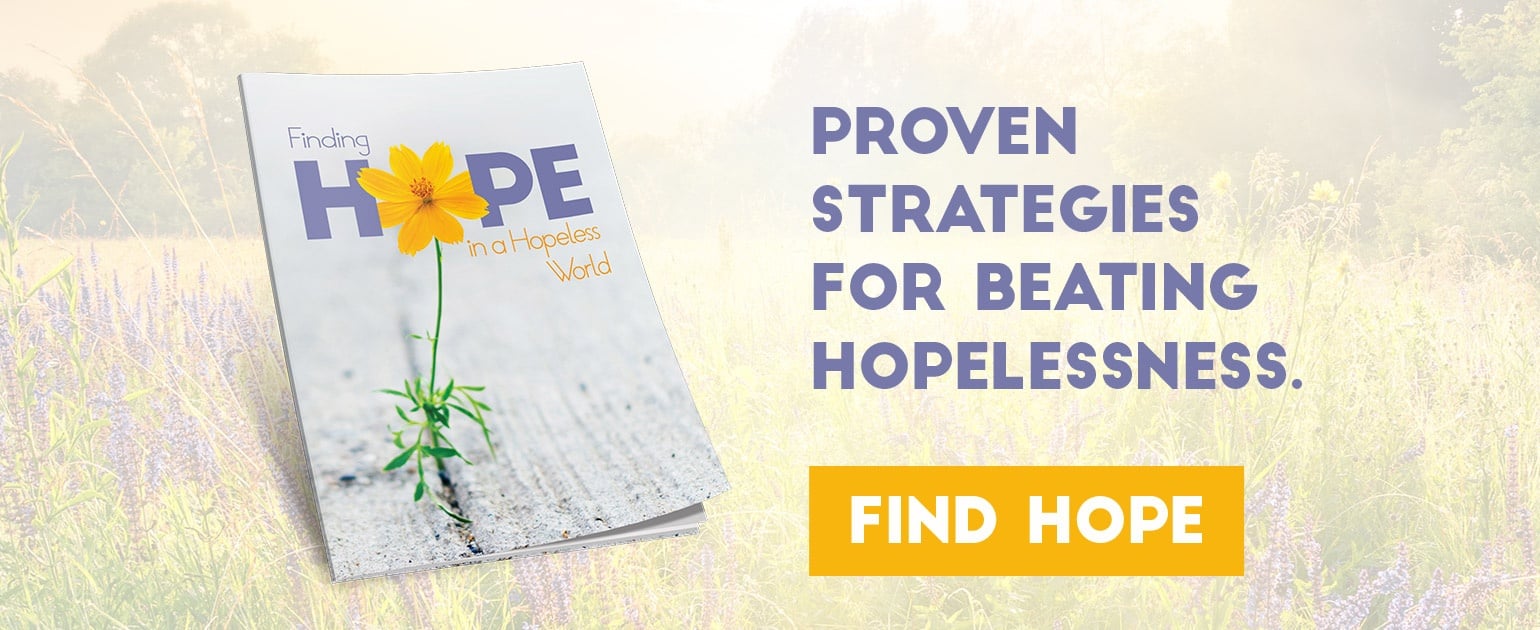.
Seven Keys to Coping With the Trials and Tribulations of Life
 “Sometimes life is tough! In troubling times we often turn to God, but do we pray for the things that will help us cope? Here are seven vital elements to request of God.
“Sometimes life is tough! In troubling times we often turn to God, but do we pray for the things that will help us cope? Here are seven vital elements to request of God.
If you have never experienced any difficulty in life, and never expect to, you can skip this article.
Ah, you’re still reading, as I suspected. Because if one thing is certain, it’s that tests and trials and problems do come upon us. They vary in origin, type, intensity and length, but come they will.
When we read in 1 Corinthians 10:13 that “no temptation has overtaken you except such as is common to man,” we can easily list the most common ones. There are health problems, the death of a loved one, financial stress, job troubles, loneliness, mistreatment, troubled relationships, dangerous circumstances, etc. Even blessings, when misused, have turned into trials for some.
And when we see unusual trials, none are so rare that others have not faced them as well.
No matter how big or small the hardship, how long it lasts, how temporary or permanent the consequences, we have to cope. Sometimes we cope well, and other times we don’t. You may recall examples of both in your own past.
But we don’t have to cope alone!
Peter says we should be humbly “casting all your care upon Him [God], for He cares for you” (1 Peter 5:7). He knows and understands our needs because “we do not have a High Priest who cannot sympathize with our weaknesses, but was in all points tempted as we are, yet without sin” (Hebrews 4:15). Therefore we can “come boldly to the throne of grace, that we may obtain mercy and find grace to help in time of need” (verse 16).
What are the needs that we should pray to God about? It’s easy to focus only on what seems obvious—I lost my job, so, God, please help me find work. I’m sick, so, God, please heal me. I’m lonely, so, God, please bring someone into my life.
We may always go to God, but we may not always ask for all the things we really need.
There is nothing wrong with asking for a specific answer to a specific problem, but is that the only thing we need in order to cope with the trial? Are there other things to ask God for as well, and maybe to ask for first?
Let’s consider seven needs—keys to surviving life’s trials—to cast upon God in our prayers.
First of all, we humans are heavily influenced by emotions, and in times of stress our emotions often fluctuate. We cannot afford to allow an unsettled emotional state to dictate our level of confidence in God. That means we need to …
1. Pray for faith
Four times Matthew records Jesus using the phrase, “O you of little faith.” Each situation differed, but in each one He identified an enemy of faith—worry, fear, doubt and human reasoning. When life goes well, those are nonissues. But in times of trial, those enemies tend to raise their ugly heads!
When the future is uncertain, when life is challenging, it’s not always easy to confidently repeat Paul’s words, “We know that all things work together for good to those who love God, to those who are the called according to His purpose” (Romans 8:28).
That’s the time to pray, “Father, please strengthen my faith. Help me to remember this.”
“We know that all things work together for good” is a statement of faith, of confidence in what you will see in the future. Faith doesn’t tell us in advance how, or when, or what we will go through, or why it will work that way. Faith just says “we know.”
Do we? When God gives us faith, we do!
It’s called walking by faith, not by sight (2 Corinthians 5:7). Sight only tells us one thing—when we see God has intervened. Faith tells us He will. We only see the past and present, and even then our perspective is often not very clear. But spiritually, God helps us see what lies ahead.
However, accepting that requires belief—faith—in Him, His Word, His way.
Why is faith important to God? Because He’s our Father. He’s in control. He wants His children to believe and trust Him.
If we have faith that God has the answers and will answer, we must also be willing to wait for Him. That means we need to …
2. Pray for patience
A scripture telling us to patiently wait for Christ’s return also holds a lesson for patiently waiting for Him to answer our prayers.
In James 5:7-8 we read, “Therefore be patient, brethren, until the coming of the Lord. See how the farmer waits for the precious fruit of the earth, waiting patiently for it until it receives the early and latter rain. You also be patient. Establish your hearts, for the coming of the Lord is at hand.”
Sometimes we say God is in control, but get impatient if He doesn’t control things on our schedule!
The moment we become impatient, we start living by the clock, not by faith: “I’m running out of time. I need this faster; I want it according to my time frame.” Impatience starts evaluating our situation according to the time passing, and if change doesn’t come when we want, our attitude easily shifts—our faith wavers.
Certainly in tough times we want quick relief. That’s understandable. But it’s so important to tell God, “My problem is in Your hands, but help me trust Your timing so I can wait patiently on You.” Patience turns off the clock; it doesn’t put God on our schedule.
James reminds us that in times of trial sometimes God is working to build something in us—perhaps an aspect of spiritual character—that doesn’t happen instantly.
“My brethren, count it all joy when you fall into various trials, knowing that the testing of your faith produces patience. But let patience have its perfect work, that you may be perfect and complete, lacking nothing” (James 1:2-4).
Letting patience “have its perfect work” isn’t easy, but God can help you with it. Ask Him to!
Patience doesn’t imply that we do nothing, however. While patiently waiting for resolution, we must often take action and make decisions. That means we need to …
3. Pray for wisdom
James also spoke to this: “If any of you lacks wisdom, let him ask of God, who gives to all liberally and without reproach, and it will be given to him” (1:5).
Big problems often require big decisions. When the doctor is asking your permission to treat your sick child in a certain way, how do you, as an untrained person, know what is in your baby’s best interest? That’s pressure, but you can’t escape it. That’s when you need wisdom to sort through all the thoughts that come to mind, wisdom to get the advice you need, wisdom to weigh pros and cons, wisdom to discern what to do when logic fails to clearly tell you.
Consider Proverbs 2:3-7: “Yes, if you cry out for discernment, and lift up your voice for understanding, if you seek her as silver, and search for her as for hidden treasures; then you will understand the fear of the LORD, and find the knowledge of God. For the LORD gives wisdom; from His mouth come knowledge and understanding; He stores up sound wisdom for the upright.”
Later in the same chapter we read, “When wisdom enters your heart, and knowledge is pleasant to your soul, discretion will preserve you; understanding will keep you, to deliver you from the way of evil, from the man who speaks perverse things” (verses 10-12).
Wisdom is a subject far too huge to detail here. These few verses, though, make the point—ask God for it!
Humanly, we have our physical, mental and emotional limitations. Knowing our tanks can run dry, we need to find the capacity to be strong. This means we need to …
4. Pray for endurance
Ephesians 6:13 encourages us to “take up the whole armor of God, that you may be able to withstand in the evil day, and having done all, to stand.” Sometimes there is nothing left that you can do but stand and ride out the storm!
“Recall the former days in which … you endured a great struggle with sufferings,” Paul said. “For you have need of endurance, so that after you have done the will of God, you may receive the promise” (Hebrews 10:32, 36).
Sometimes we just need to hang on a little longer, not give in, and not give up.
James noted, “Indeed we count them blessed who endure” (James 5:11). Do we count as blessed those who quit and give up? Maintaining the mental, physical, emotional and spiritual stamina we need can nearly exhaust us at times, but God can and will grant us strength to endure. Just ask Him!
Likewise, most stressful situations in life carry the potential of fearful consequences. That means we need to …
5. Pray for courage
After the Israelites exited Egypt, they created their own trial, which led to a 40-year stretch of hardship. As that ended, Joshua assumed the reins of leadership when Moses died, and God, knowing new challenges would arise, encouraged him. “No man shall be able to stand before you all the days of your life; as I was with Moses, so I will be with you. I will not leave you nor forsake you” (Joshua 1:5).
Then, three times in the next four verses, God exhorts him to “be strong and of good courage; do not be afraid, nor be dismayed.”
One needs courage when life is tough, when failure comes, when suffering mounts. And we don’t always have that quality on our own. So turn to God, as Paul said in 1 Corinthians 16:13, to help you “watch, stand fast in the faith, be brave, be strong.”
In recent years some fascinating studies of people with life-threatening illnesses indicate that those who maintain a particular mental quality have a stronger capacity to deal with their ordeal. That means we need to …
6. Pray for hope
Paul listed in 1 Corinthians 13 three of the most important qualities we can possess—faith, hope and love. Love is the greatest, he said, but hope is huge.
Hope is our vision of what the future holds. It keeps in mind a picture of life that helps us see beyond our present circumstances.
Hope is our vision of what the future holds. It keeps in mind a picture of life that helps us see beyond our present circumstances. Faith is the confidence, and hope is the inspiring vision.
Perhaps the most dangerous mental state one can be in is hopelessness. Paul’s fervent wish for us was that “the God of hope fill you with all joy and peace in believing, that you may abound in hope by the power of the Holy Spirit” (Romans 15:13).
Please download our free booklet Finding Hope in a Hopeless World from our LifeHopeandTruth.com website, and never underestimate the need to ask God for hope!
Having asked God for all these things—faith, patience, wisdom, endurance, courage, hope—now is the time to …
7. Pray for your specific needs
Whatever you need—the healing, the job, the friends, the money, the relief, the relationship—yes, ask God for it!
 Just remember that God knows our strengths and weaknesses, sees things we don’t see, and has the wisdom to know what is best for us. So His answer may be yes, no, maybe or wait.
Just remember that God knows our strengths and weaknesses, sees things we don’t see, and has the wisdom to know what is best for us. So His answer may be yes, no, maybe or wait.
That’s why, when we ask of Him something specific that we believe is the answer to our problem, we need to also ask for faith, patience, wisdom, endurance, courage and hope.
When we do that in time of trial, not only can we cope with our situation, but we can thrive in our relationship with Him.” From: https://lifehopeandtruth.com/life/christian-living/seven-keys-to-coping-with-the-trials-and-tribulations-of-life/?
________
Whose Prayers Won’t God Hear?
Psalm 66:18
If I regard iniquity in my heart, the Lord will not hear.
“Does God hear the prayers of sinners? Yes and no.
Yes, our merciful God always loves us and works with us, and Jesus Christ even died for us “while we were still sinners” (Romans 5:8). We were all sinners (Romans 3:23), so if God did not hear our cries for forgiveness, there would be no human He would hear. After sinning, David prayed, “Hide Your face from my sins, and blot out all my iniquities” (Psalm 51:9). God heard that prayer.
But without repentance, as Isaiah wrote, “Your sins have hidden His face from you, so that He will not hear” (Isaiah 59:2).
Psalm 66:18 talks about sin “cherished” in the heart (New International Version). “If I have known it was there and encouraged it,” then God wouldn’t listen (Adam Clarke’s Commentary on Psalm 66:18).
To be assured God will hear and answer us, we must repent and work to root sin out of our heart with God’s help. See more about repentance in “How to Repent.” From: https://lifehopeandtruth.com/bible/blog/whose-prayers-wont-god-hear/
________
Are Calcium Supplements Safe?
Transcript of video at: https://nutritionfacts.org/video/are-calcium-supplements-safe/
“The unnaturally large, rapid, and sustained calcium levels in the blood caused by calcium supplements may explain why calcium from supplements, but not from food, appears to increase the risk of heart attacks.
In 12 short years, government panels have gone from suggesting widespread calcium supplementation may be necessary to protect our bones to “Do Not Supplement”. What happened? It all started with a 2008 study in New Zealand. Short-term studies had showed that calcium supplementation may drop blood pressures by about a point. Though the effect appears to be transient, disappearing after a few months, it’s better than nothing. And excess calcium in the gut can cause fat malabsorption, by forming soap fat, reducing saturated fat absorption and increasing fecal saturated fat content. And, indeed, if you take a couple Tums along with your half bucket of KFC, up to twice as much fat would end up in your stool, and with less saturated fat absorbed in your system, your cholesterol might drop. So, the New Zealand researchers were expecting to lower heart attack rates by giving women calcium supplements. To their surprise, there appeared to be more heart attacks in the calcium supplement group.
Was this just a fluke? All eyes turned to the Women’s Health Initiative, the largest and longest randomized controlled trial of calcium supplementation. The name may sound familiar—that’s the study that uncovered how dangerous hormone replacement therapy was. Would it do the same for calcium supplements? The Women’s Health Initiative reported no adverse effects. However, the majority of the participants were already taking calcium supplements before the study started; so, effectively the study was just comparing higher versus lower dose calcium supplementation, not supplementation or no supplementation. But what if you go back and just see what happened to the women who started out not taking supplements and then were randomized to the supplement group? Those who started calcium supplements suffered significantly more heart attacks or strokes. Thus, high dose or low dose, any calcium supplementation seemed to increase cardiovascular disease risk.
Researchers went back, digging through other trial data for heart attack and stroke rates in women randomized to calcium supplements with or without vitamin D added, and confirmed the danger and most of the population studies agreed—users of calcium supplements tended to have increased rates of heart disease, stroke, and death.
The supplement industry was not happy, accusing researchers of relying in part on self-reported data—like they just ask if people had a heart attack or not rather than verifying it. And indeed long-term calcium supplementation caused all sorts of gastrointestinal distress including twice the risk of being hospitalized with acute symptoms that may have been confused with a heart attack. But no, the increased risk was seen consistently across the trials whether the heart attacks were verified or not.
OK, but why do calcium supplements increase heart attack risk, but not calcium you get in your diet? Perhaps because when you take calcium pills, you get a spike of calcium in your bloodstream that you don’t get just eating calcium rich foods. Within hours of taking supplemental calcium, the calcium levels in the blood shoot up and can stay up as long as eight hours. This evidently produces what’s called a hypercoagulable state, your blood clots more easily, which could increase the risk of clots in the heart or brain. And, indeed, higher calcium blood levels are tied to higher heart attack and stroke rates. So, the mechanism may be calcium supplements lead to unnaturally large, rapid, and sustained calcium levels in the blood, which can have a variety of potentially problematic effects.
Calcium supplements have been widely embraced on the grounds that they are a natural and, therefore, safe way of preventing osteoporotic fractures. But, it is now becoming clear that taking calcium in one or two daily doses is not natural, in that it does not reproduce the same metabolic effects as calcium in food. And furthermore, the evidence is also becoming steadily stronger that calcium supplementation may not be safe. That’s why most organizations providing advice regarding bone health now recommend that individuals should obtain their calcium requirement from diet in preference to supplements. But if we can’t reach it through diet alone, would the benefits to the bones outweigh the risks to the heart? We’ll find out, next.” From: https://nutritionfacts.org/video/are-calcium-supplements-safe/
To see any graphs, charts, graphics, images, and quotes to which Dr. Greger may be referring, watch the above video. This is just an approximation of the audio contributed by Katie Schloer.
_________
 “While sitting in a waiting room, waiting for an eye exam, an elderly gentleman walked in whose appearance caught my eye. He had a nice suit on with a very nice wool overcoat. His shoes where so shiny you could probably see yourself in them. I can assure you I did not try. I thought to myself, this guy is rich, probably a CEO. As I looked around the room, everyone else was dressed in their jeans and one lady even had holes in her jeans. When I looked at the other people in the room, and how they were dressed, I certainly was not left with the same impression as I with the immaculate dressed elderly gentleman.
“While sitting in a waiting room, waiting for an eye exam, an elderly gentleman walked in whose appearance caught my eye. He had a nice suit on with a very nice wool overcoat. His shoes where so shiny you could probably see yourself in them. I can assure you I did not try. I thought to myself, this guy is rich, probably a CEO. As I looked around the room, everyone else was dressed in their jeans and one lady even had holes in her jeans. When I looked at the other people in the room, and how they were dressed, I certainly was not left with the same impression as I with the immaculate dressed elderly gentleman. “Learn the pros, cons and safe ways to remove meat products from your diet
“Learn the pros, cons and safe ways to remove meat products from your diet  “The Creator God made humans male and female, and He made the institution of marriage. He tells us why He created it and what marriage is supposed to be.
“The Creator God made humans male and female, and He made the institution of marriage. He tells us why He created it and what marriage is supposed to be.
 “Sometimes life is tough! In troubling times we often turn to God, but do we pray for the things that will help us cope? Here are seven vital elements to request of God.
“Sometimes life is tough! In troubling times we often turn to God, but do we pray for the things that will help us cope? Here are seven vital elements to request of God.












